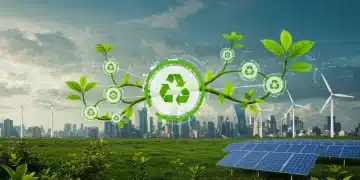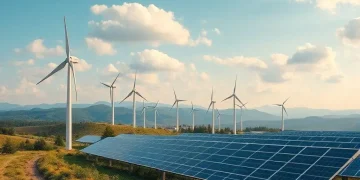Seed funding trends for eco-tech startups you need to know

Seed funding trends for eco-tech startups are increasingly driven by rising sustainability awareness, government incentives, and the growing importance of innovative technologies, making the landscape promising for future investments in green solutions.
Seed funding trends for eco-tech startups are reshaping the landscape for innovation in sustainable technology. Have you noticed how these trends are shifting? Let’s dive into what’s currently happening in this exciting space.
Understanding seed funding in eco-tech
Understanding seed funding in eco-tech can be crucial for new startups looking to make their mark in the sustainability sector. This funding type provides early-stage capital to help businesses grow and scale their innovative solutions.
What is Seed Funding?
Seed funding is often the first round of financing in a startup’s life. It helps entrepreneurs turn their ideas into reality. For eco-tech startups, this financing is particularly important due to the unique challenges they face in developing sustainable technologies.
Importance of Seed Funding for Eco-Tech Startups
Investing in eco-tech solutions is vital for addressing environmental issues. Seed funding plays an essential role in this, as it allows startups to:
- Develop prototype products.
- Conduct vital market research.
- Attract further investment in their companies.
Without this initial funding, many eco-tech startups may struggle to bring their innovative ideas to the market. With the rise in climate awareness, investors are increasingly interested in supporting solutions that promote sustainability.
Moreover, successful eco-tech businesses often leverage their initial funding to build credibility in the industry. They can showcase their products and concepts to larger investors, which can be a significant stepping stone toward larger funding rounds.
Challenges in Securing Seed Funding
While the potential for eco-tech startups is significant, challenges persist. Many traditional investors are hesitant to fund technologies that do not have immediate profitability. This can make it harder for eco-tech companies to secure the necessary capital.
However, networks focused on sustainable investments are beginning to emerge. These networks prioritize environmental impact alongside financial returns. By tapping into these resources, eco-tech startups can find the backing they need to thrive.
In conclusion, understanding seed funding in the eco-tech landscape is fundamental for new ventures aiming to succeed in this booming industry. As more investors recognize the value of sustainable solutions, the opportunities for funding will only grow.
Current trends in eco-tech investments
Current trends in eco-tech investments highlight the growing interest among investors in sustainable innovations. With increasing awareness of climate change, many venture capitalists are shifting their focus to eco-friendly technologies.
Rise of Impact Investing
Impact investing is gaining traction as more funds are dedicated to projects that have positive social and environmental outcomes. This trend emphasizes not just financial returns but also the real-world impact of investments.
- Support for renewable energy solutions.
- Funding for sustainable agriculture practices.
- Investments in clean transportation technologies.
As investors seek to align their portfolios with their values, eco-tech startups are becoming more attractive. They offer solutions that not only promise profitability but also benefit the planet.
Government and Policy Support
Another trend is the increased support from governments and international organizations. Policies designed to foster green innovation are facilitating greater funding opportunities. Many countries are offering incentives and grants for eco-tech projects.
This creates a fertile environment for startups in the eco-tech space, encouraging them to innovate and grow. These governmental interventions provide a safety net that can help reduce risks associated with early-stage investments.
Moreover, partnerships between startups and established firms are on the rise. Such collaborations often lead to more significant funding opportunities as they combine resources and expertise to tackle environmental challenges.
Shift Toward Circular Economy
The circular economy model is also influencing investment decisions. Investors are increasingly drawn to businesses that aim to minimize waste and make the most of resources. This shift encourages startups to explore innovative ways to recycle and reuse materials, leading to sustainable growth.
Finally, as the market for eco-tech continues to expand, understanding where the money flows is crucial for startups looking to secure funding. Keeping an eye on these trends can help entrepreneurs position their businesses more strategically.
Key players in eco-tech seed funding

Key players in eco-tech seed funding are vital for shaping the future of sustainable innovations. As the eco-tech sector grows, understanding who these players are can offer insights into securing the right partnerships and investments.
Venture Capital Firms
Venture capital firms focused on eco-tech are often the backbone of early funding. They invest in startups that promise to solve environmental challenges while generating profits. These firms look for:
- Innovative technologies.
- Strong business models.
- Experienced management teams.
They play a crucial role in helping new companies scale their ideas and reach wider markets.
Angel Investors
Angel investors are typically high-net-worth individuals who provide financial support in the early stages. Many are passionate about sustainability and seek to make a difference through their investments. They often invest not just money but also provide mentorship and networking opportunities.
These investors are essential for eco-tech startups, especially when traditional funding sources might be hesitant to take risks on new technologies.
Government Entities and Grants
Government programs often support eco-tech seed funding through grants and incentives. These funds can significantly lower the financial barriers for startups. Governments recognize the importance of promoting sustainable solutions and often establish funds specifically for eco-friendly initiatives.
Additionally, partnerships between governments and private sectors can enhance funding opportunities, leading to innovative eco-tech solutions.
As the sector continues to evolve, it’s important for entrepreneurs to identify and connect with these key players. Building relationships can open doors to crucial funding and resources that are essential for growth in the eco-tech space.
Challenges faced by eco-tech startups
Challenges faced by eco-tech startups are crucial to understand for anyone looking to enter this rapidly growing field. These companies are not only innovating but also navigating a unique landscape filled with obstacles.
Funding Difficulties
One of the primary hurdles is securing adequate funding. Many eco-tech startups struggle to attract investors who are willing to take risks on new technologies. Traditional investors may focus on immediate profits, making it hard for startups with long-term visions to find financial backing.
- High upfront costs for research and development.
- Lack of established track records to show potential returns.
- Competition from well-funded, traditional tech companies.
This financial uncertainty can slow down the growth and innovation of these startups, making early funding crucial.
Regulatory Challenges
Eco-tech startups must also navigate complex regulations. Each region may have different laws concerning environmental impact and sustainability. Compliance with these regulations can be both time-consuming and costly, diverting resources away from product development.
Startups often need to invest in legal expertise to ensure they meet all environmental standards, which can strain their limited budgets. The challenge lies in balancing innovation with compliance.
Market Acceptance
Another significant challenge is gaining market acceptance. Many consumers and businesses may be hesitant to switch to new eco-friendly technologies. Startups often face skepticism about the effectiveness and cost savings of their products compared to traditional solutions.
Building trust and demonstrating the value of eco-tech solutions is essential for these startups to gain a foothold in the market.
Collaboration with established companies can help bridge this gap. By showcasing successful partnerships, eco-tech startups can enhance credibility and foster consumer acceptance.
Future outlook for eco-tech funding
The future outlook for eco-tech funding is promising as global concerns about climate change and sustainability continue to rise. More investors are recognizing the potential of eco-friendly technologies, paving the way for significant growth in this sector.
Increasing Investment in Sustainability
Investments are projected to grow as industries shift towards greener solutions. This transformation is driven by:
- Government incentives and subsidies for sustainable products.
- Corporate social responsibility initiatives pushing for greener practices.
- Consumer demand for environmentally friendly options.
As these factors converge, they create a robust environment for eco-tech startups to secure funding. Investors are increasingly looking to commit resources to projects that not only show potential for profit but also contribute positively to the planet.
Emerging Technologies and Innovations
New technologies are continuously emerging, leading to exciting funding opportunities. Innovations in areas like renewable energy, waste management, and sustainable agriculture are gaining attention. Startups that harness these technologies will likely attract more investment.
For instance, advancements in battery storage and energy efficiency are crucial for the growth of renewable energy companies. As these technologies mature, they will be ripe for investment.
Collaborative Funding Models
The ecosystem for eco-tech funding is evolving with collaborative funding models. Public-private partnerships are gaining traction, allowing startups to leverage both government and private sector resources. This cooperation can help reduce risks associated with funding eco-tech initiatives.
Such collaborative efforts can enhance innovation and resource sharing, making it easier for startups to navigate the funding landscape and bring their ideas to market.
In conclusion, the future of eco-tech funding looks bright, with increasing investments, emerging technologies, and collaborative models shaping the path ahead. Entrepreneurs should stay informed about these trends to capitalize on the growing interest in sustainable solutions.
FAQ – Frequently Asked Questions about Eco-Tech Funding
What is eco-tech funding?
Eco-tech funding refers to investments made in startups and companies that are focused on developing sustainable technologies and solutions to address environmental challenges.
Why is eco-tech funding important?
It is important because it supports innovation in sustainability, helping to create environmentally friendly products and services that can mitigate climate change and promote a healthier planet.
What types of investors are interested in eco-tech?
Investors include venture capital firms, angel investors, and government entities that prioritize sustainability and are looking for innovative solutions to invest in.
What challenges do eco-tech startups face in securing funding?
Challenges include high upfront costs, difficulty in demonstrating immediate profitability, and navigating complex regulations, which can deter traditional investors.





